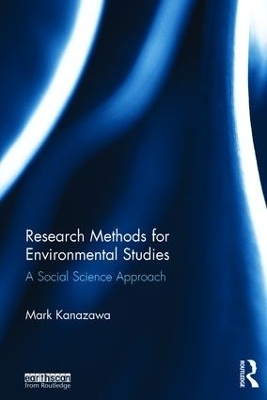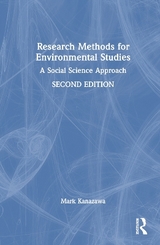
Research Methods for Environmental Studies
Routledge (Verlag)
978-1-138-68016-6 (ISBN)
- Titel erscheint in neuer Auflage
- Artikel merken
The methodological needs of environmental studies are unique in the breadth of research questions that can be posed, calling for a textbook that covers a broad swath of approaches to conducting research with potentially many different kinds of evidence.
Written specifically for social science-based research into the environment, this book covers the best-practice research methods most commonly used to study the environment and its connections to societal and economic activities and objectives. Over five key parts, Kanazawa introduces quantitative and qualitative approaches, mixed methods, and the special requirements of interdisciplinary research, emphasizing that methodological practice should be tailored to the specific needs of the project. Within these parts, detailed coverage is provided on key topics including the identification of a research project; spatial analysis; ethnography approaches; interview technique; and ethical issues in environmental research.
Drawing on a variety of extended examples to encourage problem-based learning and fully addressing the challenges associated with interdisciplinary investigation, this book will be an essential resource for students embarking on courses exploring research methods in environmental studies.
Mark Kanazawa is a Professor of Economics at Carleton University, the United States. He has also held visiting positions at Stanford, UC-Berkeley, and the University of Illinois, and he has been awarded the Jacobs Fellowship at the Huntington Library and the Simon Fellowship at the Property and Environment Research Center. Kanazawa has published research in the areas of American economic history, law and economics, new institutional economics, water policy, economics of sports, and the economics of natural resources. He teaches courses in environmental and natural resource economics, western economic history, economics of sports, econometrics, and research methods in environmental studies.
Chapter 1: Introduction to research methods in environmental studies
Chapter 2: A brief history of knowledge and argumentation
Chapter 3: General research design principles
Chapter 4: General principles of quantitative research
Chapter 5: Quantitative data and sampling
Chapter 6: Basic quantitative methods and analysis
Chapter 7: More advanced methods of quantitative analysis
Chapter 8: Spatial analysis and GIS
Chapter 9: General principles of qualitative research
Chapter 10: The case study method
Chapter 11: The ethnographic approach
Chapter 12: Actor-network theory
Chapter 13: Environmental discourse analysis
Chapter 14: Action research
Chapter 15: Mixed methods
Chapter 16: Data collection I: Principles of surveying
Chapter 17: Data collection II: Interviewing
Chapter 18: Ethical issues in environmental research
Chapter 19: Writing a research proposal
| Erscheinungsdatum | 30.01.2018 |
|---|---|
| Zusatzinfo | 5 Tables, black and white; 70 Line drawings, black and white; 16 Halftones, black and white; 91 Illustrations, black and white |
| Verlagsort | London |
| Sprache | englisch |
| Maße | 156 x 234 mm |
| Gewicht | 707 g |
| Themenwelt | Naturwissenschaften ► Biologie ► Ökologie / Naturschutz |
| Technik ► Umwelttechnik / Biotechnologie | |
| ISBN-10 | 1-138-68016-8 / 1138680168 |
| ISBN-13 | 978-1-138-68016-6 / 9781138680166 |
| Zustand | Neuware |
| Informationen gemäß Produktsicherheitsverordnung (GPSR) | |
| Haben Sie eine Frage zum Produkt? |
aus dem Bereich



